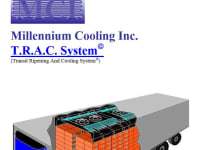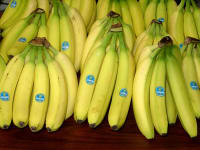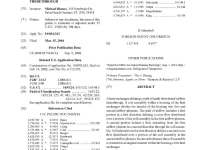The USA currently imports approximately four million boxes of green bananas per week from the growing areas in Central and South America. These bananas require specialized ripening rooms to convert them from the green, hard starchy fruit to the sweet tasting yellow fruit. The rooms cost an average of $100K each and can hold an average of 1,000 40-pound boxes of fruit. A trained specialist monitors the fruit and the temperature control system on a daily basis and it takes a further 4-8 days to get the fruit to the correct degree of ripeness needed for retail sales. There are hundreds of these ripening facilities all across the country and the fruit has to be transported to each of them by refrigerated truck or in a reefer container.
Bananas, like all fruit, have to be kept cool to preserve their freshness. However due to the tight stacking of boxes on a pallet, the natural heat of respiration of the fruit and the inadequate cooling systems during transportation, it is very difficult and time consuming to effectively and efficiently remove the field heat and the heat of respiration. This frequently causes the fruit to arrive in less than optimum condition. Furthermore the ships transporting the fruit are using an inordinate amount of bunker fuel to run the generators that provide electricity for the refrigeration systems.
The Transit Ripening And Cooling System (TRACS) (tm) resolves all these problems while reducing the transit costs for the shippers, improving the quality of the fruit by maintaining and preserving freshness and eliminates costly specialized ripening rooms for the fruit distributors.
TRACS (tm) takes advantage of the vent holes in the boxes to move sufficient refrigerated air through the boxes to remove both the field heat and the heat of respiration and, with today's advanced controls, allows for the ripening to start in transit at any time and be delivered to the supermarkets or distribution centers at the exact stage of ripeness as required by the client. TRACS removes the field heat in less than 24-hours. This can be done on land prior to loading on the ship, thus minimizing bunker fuel usage. On a small ship of 200,000 boxes the savings could be as much as 9 tons of fuel per day for at least 3 days. At 4,000,000 boxes per week the savings would be approximately 180 TONS of fuel daily. At over $600 per ton for fuel, the savings in ocean transportation costs alone would be over $324,000 weekly.
The fruit distributors would also see benefits because they would free up valuable warehouse space, eliminate expensive rooms with their associated maintenance costs and receive as much or as little fruit as they needed at any given time.
The ROI for TRACS would be less than 18 months from fees charged to the distributors that would be less than their current ripening and room maintenance costs.
Voting
-
ABOUT THE ENTRANT
- Name:Michael Bianco
- Type of entry:individual
- Profession:
- Number of times previously entering contest:never
- Michael's hobbies and activities:Photography, golf, traveling
- Michael is inspired by:Simplifying life for a more efficient and sustainable world.
- Software used for this entry:DraftSight
- Patent status:patented








